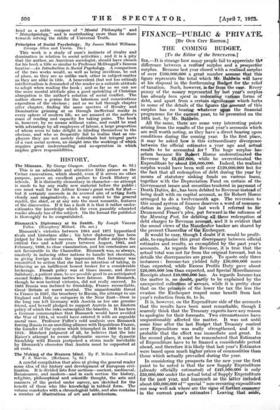Bismarck's Diplomacy at its Zenith. By Joseph Vincent Fuller. (Humphrey
Milford. 16s. net.) Bismarck's victories between 1864 and 1871 hypnotized rivals and historians alike ; his later diplomacy has been jUdged by his earlier success. Professor Fuller subjects the critical two and a-half years between August, 1885, and February, 1888, to close examination, and his conclusions are not favourable to the Chancellor. -Bismarck was, as 'always, Masterly• in inducing other nations to handle liot chestnuts, in giving foreign rivals the impression that Germany was committed to action that she had no intention of taking, in behaving as an indifferent honest broker for a considerable brokerage. Frensh policy was at times insane, and drove Salisbury, a patient man, to see possible good in an anticipated second Sedan; Russian tactics were fatuous. But Bismarck, though he won tactical victories, did not really succeed. In 1885 Russia was inclined to friendship, France reconcilable, Great-Britain at worst neutral. The unpardonable threat to France in 1887, the treachery to Russia, the attempt to use England and Italy its catspaws in the Near Eabt—these in the long run left Germany with Austria as her one genuine friend, and herself pledged to support Austria in an Eastern policy cif which the risks outweighed the benefits. It has been a German commonplace that Bismarck would have avoided the War of 1914, or would have entered it with an arguable moral' case. Profes:sor :Fuller's - cold• analysis sees Bismarck forcing Russia to an unwilling alliance with Republican France, the founder Of the' system whichtriumphed In 1998 to fall in 1918.: Rsirshest judgment of all, he believes that the late Kaiser's attempt to secure diplomatic success by. dynastic friendship with Russia postponed a storm made inevitable by Bismarck's obsession that Austria must be supported at all costs.










































 Previous page
Previous page